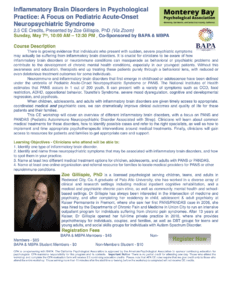Inflammatory Brain Disorders in Psychological Practice: A Focus on Pediatric Acute-Onset Neuropsychiatric Syndrome
- Sunday, May 7th, 10:00 AM – 12:30 PM Pacific Time
- Presented by Zoe Gillispie, PhD (Via Zoom)
- Co-Sponsored by BAPA & MBPA
- 2.5 CE Credits
- Registration closes May 6
- Register: https://bapapsych.org/events/EventDetails.aspx?id=1738627
Course Description:
 There is growing evidence that individuals who present with sudden, severe psychiatric symptoms may actually be suffering from inflammatory brain disorders. It is crucial for clinicians to be aware of how inflammatory brain disorders or neuroimmune conditions can masquerade as behavioral or psychiatric problems and contribute to the development of chronic mental health conditions, especially in our youngest patients. Without this awareness and education, therapists end up treating these patients purely through a behavioral lens, with reduced or even deleterious treatment outcomes for some individuals.
There is growing evidence that individuals who present with sudden, severe psychiatric symptoms may actually be suffering from inflammatory brain disorders. It is crucial for clinicians to be aware of how inflammatory brain disorders or neuroimmune conditions can masquerade as behavioral or psychiatric problems and contribute to the development of chronic mental health conditions, especially in our youngest patients. Without this awareness and education, therapists end up treating these patients purely through a behavioral lens, with reduced or even deleterious treatment outcomes for some individuals.
Neuroimmune and inflammatory brain disorders that first emerge in childhood or adolescence have been defined under the umbrella of Pediatric Acute-Onset Neuropsychiatric Syndrome or PANS. The National Institutes of Health estimates that PANS occurs in 1 out of 200 youth. It can present with a variety of symptoms, such as OCD, food restriction, ADHD, oppositional behavior, Tourette’s Syndrome, severe mood dysregulation, cognitive and developmental regression, and psychosis.
When children, adolescents, and adults with inflammatory brain disorders are given timely access to appropriate, coordinated medical and psychiatric care, we can dramatically improve clinical outcomes and quality of life for these patients and their families.
This CE workshop will cover an overview of different inflammatory brain disorders, with a focus on PANS and PANDAS (Pediatric Autoimmune Neuropsychiatric Disorder Associated with Strep). Clinicians will learn about common medical treatments for these disorders, how to identify possible cases and refer to the right specialists, as well as how to implement time-appropriate psychotherapeutic interventions around medical treatments. Finally, clinicians will gain access to resources for patients and families to get appropriate care and support.
Learning Objectives
Clinicians who attend will be able to:
1. Identify one type of inflammatory brain disorder.
2. Identify and name three neuropsychiatric symptoms that may be associated with inflammatory brain disorders and how to spot them in your practice.
3. Name at least two different medical treatment options for children, adolescents, and adults with PANS or PANDAS.
4. Name at least one online organization and referral resource for families to locate medical providers for PANS or other neuroimmune conditions.
Register
- Bay Area Psychological Associaton: https://bapapsych.org/events/EventDetails.aspx?id=1738627
About Zoe Gillispie, PhD
 Zoe Gillispie, PhD is a licensed psychologist serving children, teens, and adults in Redwood City, Ca. A graduate of Palo Alto University, she has worked in a diverse array of clinical and research settings, including medical inpatient cognitive rehabilitation and a medical and psychiatric chronic pain clinic, as well as community mental health and school-based settings. Dr. Gillispie has always been interested in the intersection of medicine and psychiatry, and after completing her residency in child, adolescent & adult psychiatry at Kaiser Permanente in Fremont, where she saw her first PANS/PANDAS case in 2006, she was hired by the Departments of Chronic Pain and Medicine in Union City to run an intensive outpatient program for individuals suffering from chronic pain syndromes. After 13 years at Kaiser, Dr. Gillispie opened her full-time private practice in 2018, where she provides psychotherapy for individuals, couples, and families, as well as DBT groups for teens and young adults and social skills groups for individuals with Autism Spectrum Disorder.
Zoe Gillispie, PhD is a licensed psychologist serving children, teens, and adults in Redwood City, Ca. A graduate of Palo Alto University, she has worked in a diverse array of clinical and research settings, including medical inpatient cognitive rehabilitation and a medical and psychiatric chronic pain clinic, as well as community mental health and school-based settings. Dr. Gillispie has always been interested in the intersection of medicine and psychiatry, and after completing her residency in child, adolescent & adult psychiatry at Kaiser Permanente in Fremont, where she saw her first PANS/PANDAS case in 2006, she was hired by the Departments of Chronic Pain and Medicine in Union City to run an intensive outpatient program for individuals suffering from chronic pain syndromes. After 13 years at Kaiser, Dr. Gillispie opened her full-time private practice in 2018, where she provides psychotherapy for individuals, couples, and families, as well as DBT groups for teens and young adults and social skills groups for individuals with Autism Spectrum Disorder.
Zoe Gillispie, PhD Website: http://zoegillispiephd.com/
Registration Fees – Registration Closes May 6
- BAPA & MBPA Members – $45
- Non-Members – $85
- BAPA & MBPA Student Members – $0
- Non-Members Student – $10
Sponsors and Credits
CPA is co-sponsoring with BAPA. The California Psychological Association is approved by the American Psychological Association to sponsor continuing education for psychologists. CPA maintains responsibility for this program and its contents. Important Notice: There is no partial credit for attending one day. Those who attend the workshop and complete the CPA evaluation form will receive 2.5 continuing education credits. Please note that APA CE rules require that we give credit only to those who attend the entire workshop. Those arriving more than 15 minutes after the start time or leaving before the workshop is completed will not receive CE credits.
Register
- Bay Area Psychological Associaton: https://bapapsych.org/events/EventDetails.aspx?id=1738627

2 comments to CE Course: Inflammatory Brain Disorders in Psy Practice: Pediatric Acute-Onset Neuropsychiatric Syndrome
Amy Scovel
May 11, 2025Is this training available in a pre-recorded format? I wasn’t able to attend but wanted to do so.
Thanks,
Amy Scovel
Gabriella True
May 12, 2025Hi, We are not aware of any recorded format. You could contact Bay Area directly.